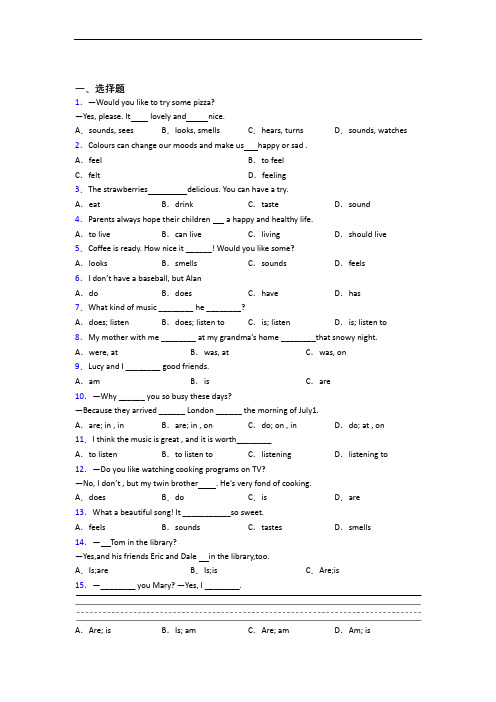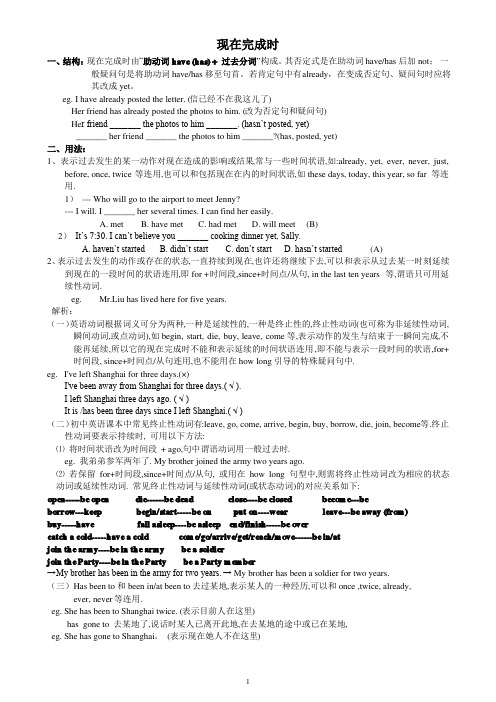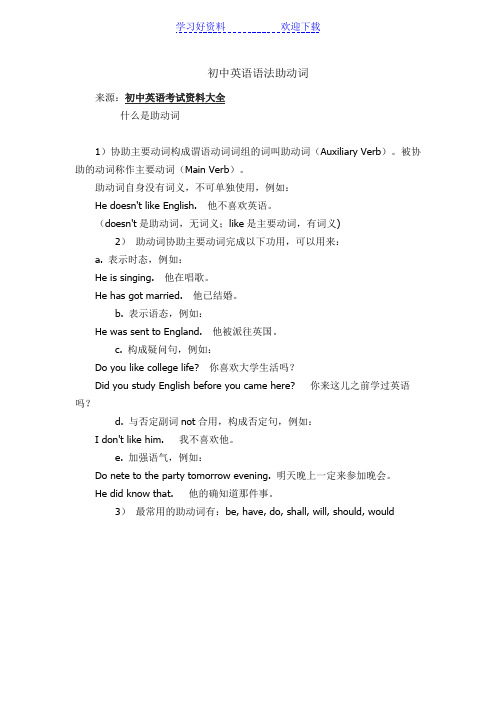初中英语助动词练习
- 格式:doc
- 大小:39.00 KB
- 文档页数:8

初中英语动词分类大全(附练习)一、什么是动词动词是用来表示主语做什么(即行为动词),或表示主语是什么或怎么样(即状态动词)的词,例如:The boy runs fast.(这个男孩跑得快。
)runs表示主语的行为He is a boy.(他是个男孩。
)is与后面的表语a boy表示主语的状态二、动词的分类动词可以按照含义及它们在句中的作用分成四类,即行为动词(也称实义动词)、连系动词、助动词和情态动词。
(一)行为动词行为动词(实义动词)是表示行为、动作或状态的词。
它的词义完整,可以单独作谓语。
例如:I live in Beijing with my mother.(我和我妈妈住在北京。
)live,住It has a round face.(它有一张圆脸。
)has,有(二)连系动词连系动词是表示主语“是什么”或“怎么样”的词,它虽有词义,但不完整,所以不能单独作谓语,必须跟表语一起构成合成谓语,例如:We are in Grade Two this year.(今年我们在两年级。
)are,是are 这个词的词义“是”在句子中常常不译出。
连系动词可具体分为三类:1、表示“是”的动词be。
这个词在不同的主语后面和不同的时态中有不同的形式,is,am,are,was,were,have/has been等要特别予以注意。
例如:He is a teacher.(他是个教师。
)He was a soldier two years ago.(两年前他是个士兵。
)We are Chinese.(我们是中国人。
)2、表示“感觉”的词,如look(看起来),feel(觉得,摸起来),smell(闻起来),sound(听起来),taste(尝起来)等,例如:She looked tired.(她看一去很疲劳。
)I feel ill.(我觉得不舒服。
)Cotton feels soft.(棉花摸起来很软。
)The story sounds interesting.(这个故事听起来很有趣。

一、时态讲解:现在完成时(1)构成:现在完成时由助动词have + 过去分词构成,助动词have 有人称和数的变化。
第三人称单数用has,其余用have.现在完成时的否定式直接在助动词后面加上not、疑问式是把助动词提到主语之前。
以(2)用法:1)现在完成时通常表示在说话之前已经完成的动作或存在的状态。
说话人强调的是该动作或状态对现在的结果或影响。
My daughter has just gone out. 我女儿刚出去。
I’m sure we’ve met before. 我肯定我们以前见过面。
She has arrived. 她到了。
2)表示持续到现在的动作或状态,往往和包括现在在内的表示一段时间的状语连用,如recently, already, just, lately, for…, since…,yet等。
如:I haven’t heard from her these days. 这些日子我没有收到她的信。
We haven’t seen you recently. 最近我们没有见到你。
They have been away for two years. 他们离开已经两年了。
She has been with us since Monday.★注意:a)since和for的区别since后接时间点,如1993,last term, yesterday, the time I got therefor后接一段时间,表示“长达多久”,如ten years, a while, two days等。
Exercise: 用since和for填空1. Jim has been in Ireland ______ Monday.2. Jill has been in Ireland ______ three days.3. His aunt has lived in Australia ______15 days.4. Mary is in her office. She has been there ______ 7 o'clock.5. India has been an independent country ______1974.6. The bus is late. They've been waiting ______ 20 minutes.7. Nobody lives in those houses. They have been empty ______ many years.8. Mike has been ill ______a long time. He has been in hospital ______ October.2)表示短暂意义的动词如arrive, leave, borrow, buy, begin, start, die等,在完成时当中不能和表示一段时间的状语连用,因为它们表示的动作不可能持续。

一、选择题1.—Would you like to try some pizza?—Yes, please. It lovely and nice.A.sounds, sees B.looks, smells C.hears, turns D.sounds, watches 2.Colours can change our moods and make us happy or sad .A.feel B.to feelC.felt D.feeling3.The strawberries delicious. You can have a try.A.eat B.drink C.taste D.sound 4.Parents always hope their children a happy and healthy life.A.to live B.can live C.living D.should live 5.Coffee is ready. How nice it ______! Would you like some?A.looks B.smells C.sounds D.feels6.I don’t have a baseball, but AlanA.do B.does C.have D.has7.What kind of music ________ he ________?A.does; listen B.does; listen to C.is; listen D.is; listen to 8.My mother with me ________ at my grandma’s home ________that snowy night. A.were, at B.was, at C.was, on9.Lucy and I ________ good friends.A.am B.is C.are10.—Why ______ you so busy these days?—Because they arrived ______ London ______ the morning of July1.A.are; in , in B.are; in , on C.do; on , in D.do; at , on 11.I think the music is great , and it is worth________A.to listen B.to listen to C.listening D.listening to 12.—Do you like watching cooking programs on TV?—No, I don’t , but my twin brother . He's very fond of cooking.A.does B.do C.is D.are 13.What a beautiful song! It ___________so sweet.A.feels B.sounds C.tastes D.smells 14.— Tom in the library?—Yes,and his friends Eric and Dale in the library,too.A.Is;are B.Is;is C.Are;is15.—________ you Mary? —Yes, I ________.A.Are; is B.Is; am C.Are; am D.Am; is16.—Do you know whom they will have ________the parts of car together?—Sorry,I have no idea.A.fix B.fixed C.to fix D.fixing17.I don't have a Ping-Pong ball, _______ my brother _______.A.but; do B.and; does C.and;do D.but; does18.Li Ming's father __________want __________the new coat.A.doesn't; buy B.don't; to buy C.don't; buy D.doesn't; to buy 19.Our teachers always make us ________ a lot of homework.A.to do B.do C.does D.doing20.— How ________ your trip to Australia?—Great. I’ll go there again next year.A.was B.is C.are D.were21.— How sweet the flowers _____ in spring!— Yes, many tourists come to enjoy them every day.A.taste B.smell C.feel22.The air _______ fresh after the rain. And the sky is blue.A.feels B.tastes C.smells D.sounds23.I like this dress very much. It soft and smooth.A.feels B.touches C.is felt D.is touched 24.2019 has come. I hope everyone can make his dream ________.A.came true B.come true C.comes true D.coming true 25.—William, your hat _______ nice.—Thanks.A.buys B.looks C.finds【参考答案】***试卷处理标记,请不要删除一、选择题1.B解析:B【解析】【分析】【详解】句意:——你想尝尝披萨吗?——好的,请。

现在完成时一、结构:现在完成时由“助动词have (has) +过去分词”构成。
其否定式是在助动词have/has后加not;一般疑问句是将助动词have/has移至句首。
若肯定句中有already,在变成否定句、疑问句时应将其改成yet。
eg. I have already posted the letter. (信已经不在我这儿了)Her friend has already posted the photos to him. (改为否定句和疑问句)He r friend _______ the photos to him _______. (hasn’t posted, yet)_______ her friend _______ the photos to him _______?(has, posted, yet)二、用法:1、表示过去发生的某一动作对现在造成的影响或结果,常与一些时间状语,如:already,yet,ever,never,just,before, once, twice等连用,也可以和包括现在在内的时间状语,如these days, today, this year, so far等连用.1)--- Who will go to the airport to meet Jenny?--- I will. I _______ her several times. I can find her easily.A. metB. have metC. had metD. will meet(B)2)It’s 7:30. I can’t believe you _______ cooking dinner yet, Sally.A. haven’t startedB. didn’t startC. don’t startD. hasn’t started(A)2、表示过去发生的动作或存在的状态,一直持续到现在,也许还将继续下去,可以和表示从过去某一时刻延续到现在的一段时间的状语连用,即for +时间段,since+时间点/从句, in the last ten years等,谓语只可用延续性动词.eg.Mr.Liu has lived here for five years.解析:(一)英语动词根据词义可分为两种,一种是延续性的,一种是终止性的,终止性动词(也可称为非延续性动词,瞬间动词,或点动词),如begin,start,die,buy,leave,come等,表示动作的发生与结束于一瞬间完成,不能再延续,所以它的现在完成时不能和表示延续的时间状语连用,即不能与表示一段时间的状语,for+时间段, since+时间点/从句连用,也不能用在how long引导的特殊疑问句中.eg. I've left Shanghai for three days.(×)I've been away from Shanghai for three days.( √ ).I left Shanghai three days ago. ( √ )It is /has been three days since I left Shanghai.( √ )(二)初中英语课本中常见终止性动词有:leave, go, come, arrive, begin, buy, borrow, die, join, become等.终止性动词要表示持续时,可用以下方法:⑴将时间状语改为时间段+ ago,句中谓语动词用一般过去时.eg.我弟弟参军两年了. My brother joined the army two years ago.⑵若保留for+时间段,since+时间点/从句,或用在how long句型中,则需将终止性动词改为相应的状态动词或延续性动词.常见终止性动词与延续性动词(或状态动词)的对应关系如下:open-----be open die------be dead close----be closed become---beborrow---keep begin/start-----be on put on----wear leave---be away (from)buy-----have fall asleep----be asleep end/finish-----be overcatch a cold-----have a cold come/go/arrive/get/reach/move------be in/atjoin the army----be in the army be a soldierjoin the Party----be in the Party be a Party member→My brother has been in the army for two years.→ My brother has been a soldier for two years.(三)Has been to和been in/at been to去过某地,表示某人的一种经历,可以和once ,twice, already, ever, never等连用.eg. She has been to Shanghai twice. (表示目前人在这里)has gone to去某地了,说话时某人已离开此地,在去某地的途中或已在某地,eg. She has gone to Shanghai。


学习好资料欢迎下载
初中英语语法助动词
来源:初中英语考试资料大全
什么是助动词
1)协助主要动词构成谓语动词词组的词叫助动词(Auxiliary Verb)。
被协助的动词称作主要动词(Main Verb)。
助动词自身没有词义,不可单独使用,例如:
He doesn't like English.他不喜欢英语。
(doesn't是助动词,无词义;like是主要动词,有词义)
2)助动词协助主要动词完成以下功用,可以用来:
a. 表示时态,例如:
He is singing.他在唱歌。
He has got married.他已结婚。
b. 表示语态,例如:
He was sent to England.他被派往英国。
c. 构成疑问句,例如:
Do you like college life?你喜欢大学生活吗?
Did you study English before you came here?你来这儿之前学过英语吗?
d. 与否定副词not合用,构成否定句,例如:
I don't like him.我不喜欢他。
e. 加强语气,例如:
Do nete to the party tomorrow evening. 明天晚上一定来参加晚会。
He did know that.他的确知道那件事。
3)最常用的助动词有:be, have, do, shall, will, should, would。
中考英语助动词用法整理愿你像那小小的溪流,将那高高的山峰作为生命的起点,一路跳跃,一路奔腾,勇敢地勇敢地奔向生活的大海。
下面是小编给大家带来的中考英语助动词用法,欢迎大家阅读参考,我们一起来看看吧!初中英语语法:助动词shall和will的用法shall和will作为助动词可以与动词原形一起构成一般将来时,例如:I shall study harder at English. 我将更加努力地学习英语。
He will go to Shanghai. 他要去上海。
说明:在过去的语法中,语法学家说shall用于第一人称,will 只用于第二、第三人称。
现在,尤其是在口语中,will常用于第一人称,但shall只用于第一人称,如用于第二、第三人称,就失去助动词的意义,已变为情态动词,试比较:He shall come. 他必须来。
(shall有命令的意味。
)He will come. 他要来。
(will只与动词原形构成一般将来时。
)初中英语语法:助动词do 的用法1) 构成一般疑问句,例如:Do you want to pass the CET? 你想通过大学英语测试吗?Did you study German? 你们学过德语吗?2) do + not 构成否定句,例如:I do not want to be criticized. 我不想挨批评。
He doesn't like to study. 他不想学习。
In the past, many students did not know the importance of English. 过去,好多学生不知道英语的重要性。
3) 构成否定祈使句,例如:Don't go there. 不要去那里。
Don't be so absent-minded. 不要这么心不在焉。
说明:构成否定祈使句只用do,不用did和does。
4) 放在动词原形前,加强该动词的语气,例如:Do come to my birthday party. 一定来参加我的生日宴会。
初中英语语法复习之助动词怎么用整理在英语语法的学习中,有一点特别重要,那就是孩子自身没有状态,不乐观主动的对待学习这件事情,英语成果永久都提升不上去。
下面是我给大家带来的学校英语语法复习之助动词,欢迎大家阅读参考,我们一起来看看吧!英语学问点:助动词帮助主要动词构成谓语动词词组的词叫助动词,被帮助的动词称作主要动词。
构成时态和语态:助动词是语法功能词,自身没有词义,不行单独使用,它没有对应的汉译,例如:HedoesntlikeEnglish.他不喜爱英语。
(doesnt是助动词,无词义;like是主要动词,有词义)助动词主要是do,以及它的两种时态:does和did。
例:Does he work in the factory? 他是在这个工厂工作吗?Do you have a pen? 你有一支钢笔吗?He didn’t go to school yesterday. 他昨天没有去上学。
助动词do 的用法:1)构成一般疑问句,例如:Do you want to pass the CET?你想通过高校英语测试吗?Did you study German?你们学过德语吗?2) do + not 构成否定句,例如:I do not want to be criticized.我不想挨批判。
He doesnt like to study.他不想学习。
In the past, many students did not know the importance of English.过去,好多同学不知道英语的重要性。
3)构成否定祈使句,例如:Dont go there.不要去那里。
Dont be so absent-minded.不要这么心不在焉。
说明:构成否定祈使句只用do,不用did和does。
4)放在动词原形前,加强该动词的语气,例如:Do come to my birthday party.肯定来参与我的生日宴会。
一、选择题1.—I am feeling ill. What should I do?— eating junk food and breakfast every day.A.Stop; having B.Stop; have C.To stop; have. D.To stop; to have 2.—________ Mary________ fruit? —Of course.A.Is; like B.Does; likes C.Does; like D.Do; likes 3.Kay looked _________ at the guests who said that the food she cooked tasted _________. A.happily; wonderfully B.happily; wonderfulC.happy; wonderful D.happy; wonderfully4.The strawberries delicious. You can have a try.A.eat B.drink C.taste D.sound5.My parents don’t_______me eat_______junk food.A.like; too many B.want; too muchC.ask; too many D.let; too much6.Lucy and I ________ good friends.A.am B.is C.are7.This is a photo of my grandpa. He youngA.looks B.feels C.sounds D.hears 8.—He’s never been late for school.—________________.A.So have I B.So am I C.Neither have I D.Nor am I 9.Amy and her best friend often________books together.A.read B.reads C.look D.looks 10.—Hey, Jack. Do you want to go to the library? —That ________ great. I love reading. A.hears B.looks C.sounds D.listens 11.—The books on the table_________ Mike’s, right?—Yes, they are.A.am B.is C.are12.Colours can change our moods and make us happy or sad .A.feel B.to feelC.felt D.feeling13.Speak louder, ________ you can’t make yourself________.A.and; hear B.or; hear C.and; heard D.or; heard 14.________your brother________ a baseball?A.Do; have B.Does; has C.Does; have D.Do; has 15.This my sister and those my brothers.A.is, is B.are, are C.is, are16.I don't have a Ping-Pong ball, _______ my brother _______.A.but; do B.and; does C.and;do D.but; does17.In fact (事实上), she ________ ________ many ________.A.doesn’t has; toies B.don’t has; toies C.doesn’t have; t oys D.don’t have; toys 18.Their eyes __________blue, but ours_________black.A.are; are B.is; are C.are; is . D.are; is19.The baby is crying. Her brother tries her best to make her ______A.to laugh B.laugh C.laughing D.laughed 20.The water ______ cool when I jumped into the pool for morning exercise.A.was felt B.is felt C.felt D.feels21.--Lucy______her mother and her mother______very young.A.looks like; looks like B.looks like; looksC.looks; looks like D.looks; looks22.I don’t have a baseball, but my brother_________.A.is B.has C.does23.Peter has never seen such a big fish in his life, ________?A.has he B.hasn’t he C.does he D.doesn't he 24.Mike and Jeff________ TV on weekdays.A.doesn't watch B.don't watch C.watches D.not watch 25.—Where_______you come from?—I______from JapanA.are; am B.are; come C.do; come【参考答案】***试卷处理标记,请不要删除一、选择题1.B解析:B【解析】【分析】【详解】句意:——我感觉生病了。
初中英语语法学习之常考助动词用法分析(二)will的用法:1)用于将来时态(各种人称后都可以用):I’ll give you a definite answer tomorrow. 明天我将给你个明确回答。
We will never again be separated. 我们再也不会被分开。
Will you be taking your leave in South Africa? 你准备在南非度假吗?By this time next year she will have taken her university degree. 明年这时她将已获得大学学位。
It looks as if he won’t be in time for the train. 看来他好像赶不上火车了。
2)用于疑问句表示请求:Will you tell her that I’m Mrs. Pater? 你可否告诉她我是佩特夫人?Will you have a little soup? 你要不要喝点汤?Bring me the paper, will you? 把报纸拿给我好吗?Will you please sit down, everybody? 请大家坐好。
Won’t you take off your overcoat? 你要不要把大衣脱掉?3)用于各个人称,表示:a. 愿意,肯:I will have nothing to do with this matter. 我不愿和这事扯上关系。
I meant to reason with you, but you won’t reason. 我是想和你讲道理,但你不听劝。
She won’t so much as look at David. 她连看大卫一眼都不肯。
Go where you will. 你想去哪里就去哪里。
If you will allow me, I will see you home. 如你允许,我愿意送你回家。
学习必备 欢迎下载 复习be助动词和do 助动词 一. 用is , am, are , , do , does , 来填空 1. He _____ from a small town in North China. 2. They ____ kind to us . 3. I _____ interested in playing football. 4. _____ you like swimming ? 5. _____ he go to school by bus every day? 6. ______ they do their homework every day? 7. _____ Tom good at maths? 8. ____ Sam and Tim like climbing trees? 9. _____ She busying doing her homework? 10. We _____ all middle school students.
二. 用 like 和 likes 填空 1. I _____ collecting stamps. 2. He _____ flying kites on sunny days. 3. They ______ running and jumping. 4. Jack ____ riding bicycles on summer days. 三. 把下列句子变成疑问句,并作肯定和否定的回答 1. He is the tallest students in our class. 2. They are running on the playground. 3. She can sing and dance. 4. They must get up early. 5. He may come here by train. 四.把下列句子变成疑问句,并作肯定和否定的回答 1. They speak English every day. 2. He speaks English every day. 3. The have a large room. 4. He has a large room. 五.区分下列哪些是主系表结构,那些是主谓宾结构 1. We are Chinese. 2. We study hard. 3. He is a good friend of my father. 4. He likes playing basketball. 5. They do well in drawing pictures. 学习必备 欢迎下载 六.用is, am, are, was , were, do, does , did 填空 1. He ____ my Chinese teacher. 2. They _____ from Canada. 3. I _____ taller than my sister. 4. She ____ a nurse five years ago. 5. They _____ very short ten years ago. 6. I ____ six years old eight years ago. 7. _____ they help you with your work? 8. _______ he go to the cinema on Sundays? 9. ______ they give you some useful books? 10. ______ he visit the school yesterday? 七.汉译英 1. 英语是我最喜欢的科目。 2. 他是我们的音乐老师。 4. 他们是我的叔叔们。 5. 五年前,他是一名邮递员。 6. 他每天吃面包。 7. 他们每天吃面包。 8. 他每天骑自行车去上学。 9. 我们每天骑自行车去上学。 10. 她昨天去看望了他的祖父母。 八. 用don’t 和doesn’t 及 didn’t填空 1. we ____ like playing computer games, he ____ like either. 2. She ______ like going shopping on Sundays. 3. They _____ study hard three years ago. 4. We _______ go to school yesterday. 5. Tom and Tim _____ like watering flowers. 6. These men _____ like smoking. 7. The dog _____ like eating bones. 8. I _____ have my own house two years ago. 学习必备 欢迎下载 九.把下列句子变成否定句和疑问句 1. He is a middle school student. He isn’t a middle school student. Is he a middle school student? 2. She is the shortest in the class. 3. That is a difficult problem. 4. They are swimming in the river. 5. I am doing my homework. 6. She is drawing a picture now. 7. He can sing English songs. 8. They must get up early in the morning. 9. He will come to see us next month. 10. They are going to have a meeting next Monday. 十. 把下列句子变成否定句和疑问句 1. They go to school on foot every day. 2. He goes to school by bus every day. 3. They went to school on foot yesterday. 4. He went to school by bus yesterday. 5. They play football every Sunday. 6. They played football last Sunday. 7. They will give us a talk next Tuesday. 8. They have given us three talks so far. 9. They had given us three talks before they left. 10. He was doing his homework when his mother came home. 11. They were playing chess when the teacher came in. 十一。用下列动词的适当形式填空 1. There _________(be) three dogs under the tree. 2. They _________(have ) got three dictionaries. 3. He _________(read) a book when the telephone rang. 4. You had better _________(go) home at once. 2011.11.13 学习必备 欢迎下载 同一动词的各种形式 11.13 十二。写出下列动词的五种形式 原形 不定时 第三人称单数 过去式 现在分词 过去分词 jump to jump jumps jumped jumping jumped climb play dance open close 十三。写出下列动词的五种形式 原形 不定时 第三人称单数 过去式 现在分词 过去分词 go to go goes went going gone come have do make take hear say read write sing draw sit stand lie run eat drink get 学习必备 欢迎下载 Be动词在八种时态中的表现 练习:一。用be动词的适当形式填空 1. It ______(be) an interesting story. 2. They ______(be) interested in playing football. 3. She ______(be) a middle aged woman. 4. He ______(be) doing his homework. 5. I ______(be) afraid I can’t go with there with you. 6. There ______(be) a book on the table. 7. There ______(be) two books on the table. 8. There ______(be) a meeting tomorrow. 9. There ______(be) a meeting yesterday. 10. I ______(be) a middle school student. 11. I ______(be) a primary school student five years ago. 12. I ______(be) a high school student next year. 13. I ______(be) a middle school student for two and half years. 14. I ______(be) a middle school student two years before. 15. He said he ______(be) a college student in five years. 16. Look! They ______(be) walking across the street. 二.单选 1. They _______ here for eight years. A. were B. will be C. have been 2. What _____ the tree ____ in three years? A. will, be B. does ,be C. do , be 3. He ____ a teacher before I came here. A. have been B. had been C. is 4. He _____ a teacher since he came here. A. have been B. has been C. had been 5. He said there ____ a new school the next year. A. will be B. would be C. was 6. Tom and Sam ____ good friends three years ago. A. was B. were C. is